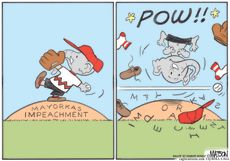A linguistic dissection of our affect/effect problem
Almost everyone mixes these two words up at some point. It didn't have to be this way.

A lot of people struggle with affect vs. effect, but let's assume that you've got the difference down cold: Affect is a verb (usually), and effect is a noun (usually).
But how did it happen that two clearly related words, one a verb and the other a noun, are distinguished only by a difference in spelling that doesn't make a difference in the pronunciation?
It could have been different. For the verb affect, we could have had the noun form affection. Oh, wait — we do. Unfortunately, it's the noun form for a meaning of affect that we don't have anymore: to have a liking for something.
Subscribe to The Week
Escape your echo chamber. Get the facts behind the news, plus analysis from multiple perspectives.

Sign up for The Week's Free Newsletters
From our morning news briefing to a weekly Good News Newsletter, get the best of The Week delivered directly to your inbox.
From our morning news briefing to a weekly Good News Newsletter, get the best of The Week delivered directly to your inbox.
Well, then, how about affectation? That's the noun form for a meaning of affect that we still do have: to deliberately aim at something, like a British accent, or an air of amused detachment. But it doesn't cover "the act of affecting something," which is the meaning we're after.
What about a change in the stress, pronouncing the verb "af-FECT" and the noun "AFF-ect"? Shoot! Once again, we already have that noun, and once again, it doesn't have the meaning we want. This time, it goes with a specialized meaning of affect: "to have an influence on someone emotionally."
If you're thinking that affect has had a lot of meanings over the years, you're right. Part of the reason is that it actually derives from two sources. One is the Latin verb afficere, meaning "to affect, move, influence, impress," among other things. The other is the so-called frequentative form affectare, meaning "to aim or strive for."
In any case, the verb affect has had so many meanings that just about all the noun forms have been exhausted on rare, obsolete, or specialized meanings. About the only possibilities I see left are affectment and affectance, but the moment seems to have passed for creating these forms.
Sign up for Today's Best Articles in your inbox
A free daily email with the biggest news stories of the day – and the best features from TheWeek.com
Meanwhile, there's the noun effect, derived from the Latin verb efficere, which according to my New College Latin & English Dictionary, means "to bring about, bring to pass." Most of the phonetic similarity between afficere and efficere is due to their common origin in the Latin verb facere, meaning "make" or "do."
The rest of the phonetic similarity comes from the nature of the prefixes that combined with facere. While some of those Latin prefixes gave us nice, distinct words like infect, perfect, and defect, others, including ad and ex, changed their final consonant to assimilate to the f of facere. This is why instead of having the different-sounding adfect and exfect, we have the same-sounding affect and effect.
Effect comes from the past participle effectum, which means something that has been brought about, or in other words, a result. The meaning of efficere even comes through clearly in the verb effect, as in effect a change. In other words, the noun effect really does have an associated verb form, but just as with all those noun forms of affect, the associated verb is somewhat rare.
So we have the verb affect "to influence" without a readily available noun form, and the noun effect "result," without a readily available verb form. Add to this mutual need the similar semantics and the nearly identical phonetics, and it's no wonder that the two words have formed a duo.
Create an account with the same email registered to your subscription to unlock access.
Neal Whitman is a columnist for the online resource Visual Thesaurus, and an occasional guest writer for the podcast "Grammar Girl's Quick and Dirty Tips for Better Writing." He teaches ESL composition at The Ohio State University, and blogs at Literal-Minded, where he writes about linguistics from the point of view of a husband and father.
-
 Today's political cartoons - April 18, 2024
Today's political cartoons - April 18, 2024Cartoons Thursday's cartoons - impeachment Peanuts, record-breaking temperatures, and more
By The Week US Published
-
 Pros and cons of solar energy
Pros and cons of solar energyPros and cons Solar power could become the primary source of electricity worldwide by 2050 – but there are still clouds in the forecast
By Rebecca Messina, The Week UK Published
-
 Post Office's Capture software to be reviewed over 'glitches'
Post Office's Capture software to be reviewed over 'glitches'Speed Read Solicitor representing accused postmasters says flaws in the IT system follow 'very similar pattern' to Horizon
By Arion McNicoll, The Week UK Published